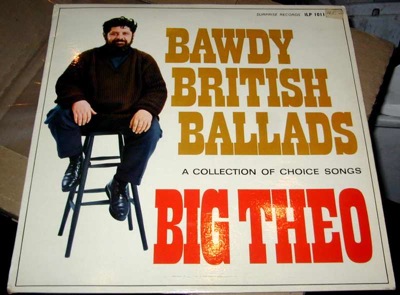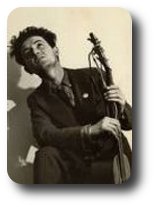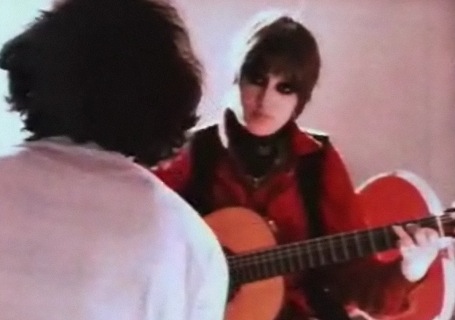Email from an old folkie
01/02/12 20:58

We recently received an email from one of the great folkies of the 1960’s, E. Van Johnson. Thanks for sharing your memories with us.
Many of the people you mention on your site I knew personally. My Brother Theo ran one of the first Folk Clubs in the cellar of Bunjies Leicester Square. I played there from 1958 and became resident there from 1959 till 63. I also played many of the London clubs and coffee bars of which there were over 200.
Some of the people I met and knew quite well were, Tom Paxton, Paul Simon, Jackson C Frank, Darrel Adams, Sonny Terry and Brownie Magee, Sonny Boy Williams. We had a large flat in Twickenham, and many a night after a gig in town, many players would turn up and we would jam late into the next morning. Read More...
Comments
Who gives a folk?
25/06/08 23:32
Join us for the first ever Time Out Battle Satellite in association with Vibe Live:

Folk, the people’s music, means many things to many people. Folk music often seems squeezed from above and below. Pop music, and the folk-fusions that follow in its wake, are seen by some purists as diluting the folk tradition. At the same time it seems that this ‘people’s culture’ is scorned by the cultural establishment. In the last few years, however, a revival of English folk music has seen a plethora of new folk styles sprout up, from nu-folk to twisted folk, from Bat for Lashes to Tunng and even twindie, a new generation seems to be giving folk new meaning and an unexpected lease of life. Has folk finally left behind its parochial, twee image?
Politics seems to be an essential part of the revival. From the Levellers’ Battle of the Beanfield to Clan Dyken’s ‘eco-folk’, have ‘new age’ subcultures and green politics helped to recover folk’s radical roots? Some hope a revived folk tradition might help create a more ‘radical’ English identity and heritage, an alternative to the flag-waving jingoism of Rule Britannia. Liberal peer Lord Redesdale wants to have 14,000 morris dancers at the 2012 Olympics. But is folk in danger of being co-opted and sanitised just as it seems to be reinvigorated? At the start of the 20th century progressive enthusiasts propagated the idea that folk music could reconnect ‘the people’ with their past, and with each other, and inspire a collective outlook. In the very different political context of the 21st century, is folk music fulfilling its potential, or is it just another brand?
Join the legendary singer Barb Jungr, the Daily Telegraph music critic Ivan Hewett, Time Out music editor Eddy Lawrence, together with the music journalist Neil Davenport, music scholar Cara Bleiman and folk enthusiasts Don Eales and Abdul Rehman-Malik in discussion with the Institute of Ideas and Guardian arts blog’s Shirley Dent to find out who really does give a folk. Hang on to your harmonica and prepare to fight your corner in the first Time Out Battle Satellites 2008 in association with Vibe Live.
Vibe Live, 91-95 Brick Lane, London, E1 6QL, 7 - 9pm 29 July 2008
Tickets £7.50/5.00 available online at www.battleofideas.org.uk or by telephone on 020 7269 9220

Folk, the people’s music, means many things to many people. Folk music often seems squeezed from above and below. Pop music, and the folk-fusions that follow in its wake, are seen by some purists as diluting the folk tradition. At the same time it seems that this ‘people’s culture’ is scorned by the cultural establishment. In the last few years, however, a revival of English folk music has seen a plethora of new folk styles sprout up, from nu-folk to twisted folk, from Bat for Lashes to Tunng and even twindie, a new generation seems to be giving folk new meaning and an unexpected lease of life. Has folk finally left behind its parochial, twee image?
Politics seems to be an essential part of the revival. From the Levellers’ Battle of the Beanfield to Clan Dyken’s ‘eco-folk’, have ‘new age’ subcultures and green politics helped to recover folk’s radical roots? Some hope a revived folk tradition might help create a more ‘radical’ English identity and heritage, an alternative to the flag-waving jingoism of Rule Britannia. Liberal peer Lord Redesdale wants to have 14,000 morris dancers at the 2012 Olympics. But is folk in danger of being co-opted and sanitised just as it seems to be reinvigorated? At the start of the 20th century progressive enthusiasts propagated the idea that folk music could reconnect ‘the people’ with their past, and with each other, and inspire a collective outlook. In the very different political context of the 21st century, is folk music fulfilling its potential, or is it just another brand?
Join the legendary singer Barb Jungr, the Daily Telegraph music critic Ivan Hewett, Time Out music editor Eddy Lawrence, together with the music journalist Neil Davenport, music scholar Cara Bleiman and folk enthusiasts Don Eales and Abdul Rehman-Malik in discussion with the Institute of Ideas and Guardian arts blog’s Shirley Dent to find out who really does give a folk. Hang on to your harmonica and prepare to fight your corner in the first Time Out Battle Satellites 2008 in association with Vibe Live.
Vibe Live, 91-95 Brick Lane, London, E1 6QL, 7 - 9pm 29 July 2008
Tickets £7.50/5.00 available online at www.battleofideas.org.uk or by telephone on 020 7269 9220
Dope - a film by Sheldon Rochlin and Diane Rochlin.
03/04/08 21:35

Shot in the lilting, evocative style of filmmakers Sheldon and Diane Rochlin, the film-celebrated for its subversive content-was shown at the Whitney Museum of American Art in 1975. Praised as a film "ahead of its time” by Ricky Leacock, the Rochlins signed a distribution contract with Leacock-Pennebaker. But just as the final editing was completed, the distribution arm of Leacock-Pennebaker went bankrupt. The film has remained an underground indie classic ever since.
This is a feature documentary about a young girl’s descent into drugs. Shot in late-sixties London, we see ravishing Caroline--black makeup around her eyes and tattooed head to toe--become a junkie. We come to understand not only the drug lure of the era, but also the soul of a free spirit who is caught in the grip of forces she cannot penetrate or comprehend. Like a butterfly caught in a web, Caroline struggles against her fate, but its seductive attractions threaten to vanquish her.
London 67-68, features music by GENO FOREMAN (Cocaine, When You Hear Those Cuckoos Calling, Some Call Me a Junkie..) and a voice also tells the "story" of Geno's death in London.
Read More...
